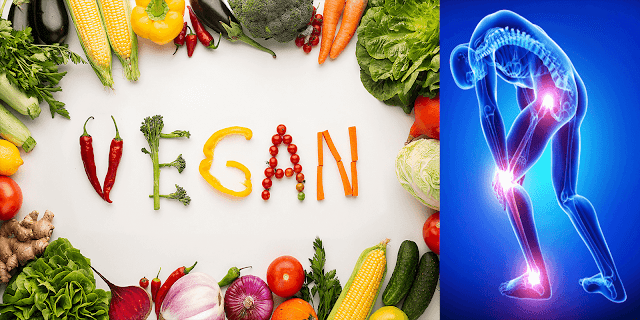A Vegan Diet Helps With Arthritis Pain


Vegan Diet May Give Relief From Arthritis Pain
According to a new research, a low-fat vegan diet without calorie limitations relieves joint discomfort in rheumatoid arthritis patients. Weight reduction and better cholesterol levels were also reported by trial participants.
The findings were reported in the 'American Journal of Lifestyle Medicine.' "For millions of patients suffering from rheumatoid arthritis, a plant-based diet might be the prescription," stated Neal Barnard, MD, principal author of the research and head of the Physicians Committee.
"And all of the side effects, including as weight reduction and decreased cholesterol," she noted, "are solely good." Rheumatoid arthritis is an autoimmune illness that causes joint swelling, discomfort, and eventually irreversible joint destruction.
Participants in the Physicians Committee trial were asked to assess the level of their worst joint pain in the previous two weeks using a visual analog scale (VAS), ranging from "no pain" to "pain as awful as it could possibly be."
Tender joints, swollen joints, and C-reactive protein readings, which indicate inflammation in the body, were also used to compute each participant's Disease Activity Score-28 (DAS28). DAS28 levels rise as rheumatoid arthritis progresses. During the 16-week trial, 44 persons with rheumatoid arthritis were randomly allocated to one of two groups.
The first group followed a vegan diet for four weeks, then excluded additional items for three weeks before reintroducing them one by one during a nine-week period. There were no meals given, and participants were responsible for their own food preparation and purchasing with the help of the study staff. The second group ate anything they wanted but were required to consume a daily placebo capsule, which had no influence on the outcome of the research.
After then, the diets of the two groups were exchanged for 16 weeks. DAS28 fell 2 points on average during the vegan phase of the trial, indicating a higher reduction in joint pain, compared to 0.3 points during the placebo period. In the vegan period, the average number of swollen joints reduced from 7.0 to 3.3, whereas in the placebo phase, it climbed from 4.7 to 5.
VAS scores improved considerably in the vegan period compared to the placebo phase for those who completed the research. In a sub-analysis that removed individuals who increased drugs during the research and another sub-analysis that excluded participants who made no medication modifications, the vegan diet resulted in higher reductions in DAS28.
In addition to pain and edema decreases, the vegan diet resulted in an average weight loss of 14 pounds, compared to a gain of 2 pounds on the placebo diet. During the vegan period, there were also higher decreases in total, LDL, and HDL cholesterol.
According to a new research, a low-fat vegan diet without calorie limitations relieves joint discomfort in rheumatoid arthritis patients. Weight reduction and better cholesterol levels were also reported by trial participants.
The findings were reported in the 'American Journal of Lifestyle Medicine.' "For millions of patients suffering from rheumatoid arthritis, a plant-based diet might be the prescription," stated Neal Barnard, MD, principal author of the research and head of the Physicians Committee.
"And all of the side effects, including as weight reduction and decreased cholesterol," she noted, "are solely good." Rheumatoid arthritis is an autoimmune illness that causes joint swelling, discomfort, and eventually irreversible joint destruction.
Participants in the Physicians Committee trial were asked to assess the level of their worst joint pain in the previous two weeks using a visual analog scale (VAS), ranging from "no pain" to "pain as awful as it could possibly be."
Tender joints, swollen joints, and C-reactive protein readings, which indicate inflammation in the body, were also used to compute each participant's Disease Activity Score-28 (DAS28). DAS28 levels rise as rheumatoid arthritis progresses. During the 16-week trial, 44 persons with rheumatoid arthritis were randomly allocated to one of two groups.
The first group followed a vegan diet for four weeks, then excluded additional items for three weeks before reintroducing them one by one during a nine-week period. There were no meals given, and participants were responsible for their own food preparation and purchasing with the help of the study staff. The second group ate anything they wanted but were required to consume a daily placebo capsule, which had no influence on the outcome of the research.
After then, the diets of the two groups were exchanged for 16 weeks. DAS28 fell 2 points on average during the vegan phase of the trial, indicating a higher reduction in joint pain, compared to 0.3 points during the placebo period. In the vegan period, the average number of swollen joints reduced from 7.0 to 3.3, whereas in the placebo phase, it climbed from 4.7 to 5.
VAS scores improved considerably in the vegan period compared to the placebo phase for those who completed the research. In a sub-analysis that removed individuals who increased drugs during the research and another sub-analysis that excluded participants who made no medication modifications, the vegan diet resulted in higher reductions in DAS28.
In addition to pain and edema decreases, the vegan diet resulted in an average weight loss of 14 pounds, compared to a gain of 2 pounds on the placebo diet. During the vegan period, there were also higher decreases in total, LDL, and HDL cholesterol.
In addition to pain and edema decreases, the vegan diet resulted in an average weight loss of 14 pounds, compared to a gain of 2 pounds on the placebo diet. During the vegan period, there were also higher decreases in total, LDL, and HDL cholesterol.

Comments
Post a Comment